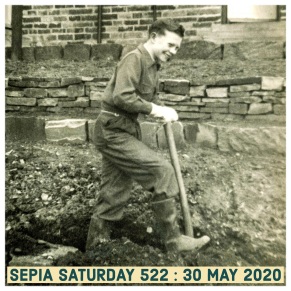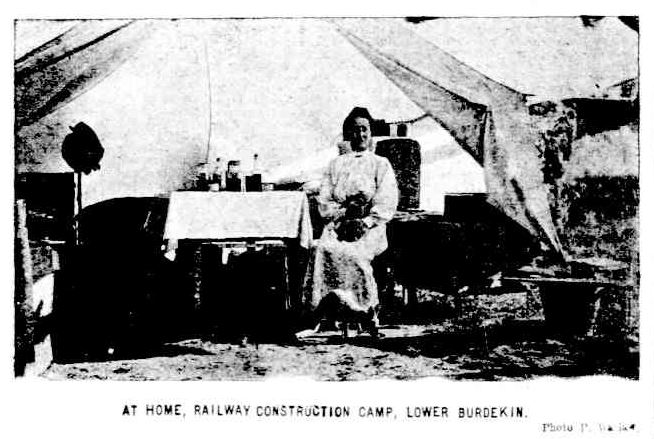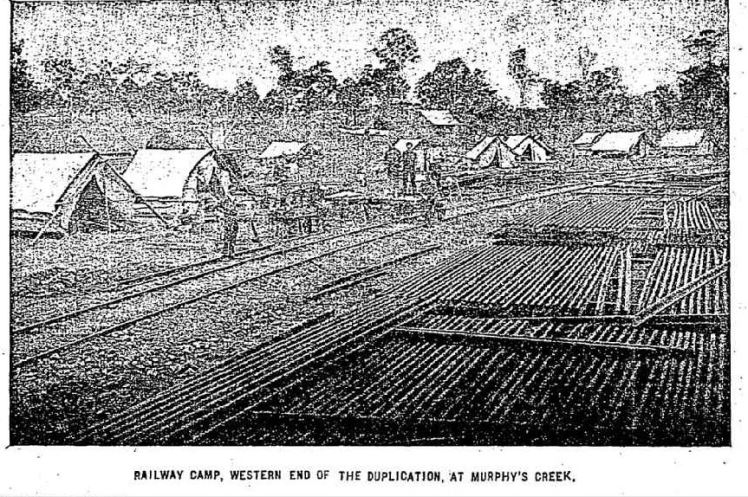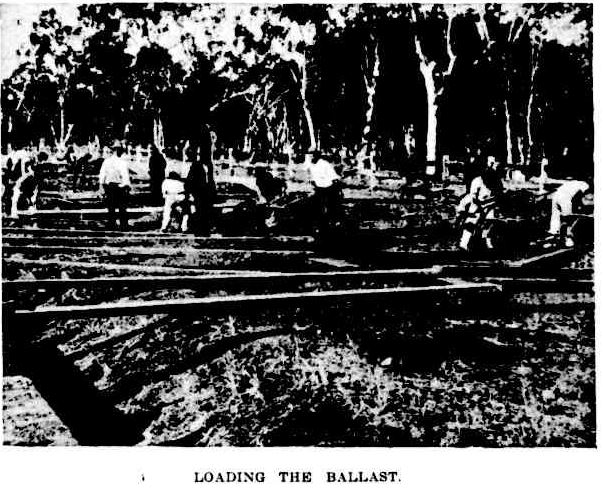 One of the things I like about Sepia Saturday is that it makes you think about how the image might relate to your family’s stories. This week’s image just didn’t ring bells for me even though there are farmers on my tree. It took until Sunday for me to have a lightbulb moment. I may have no photos of my farmers but I also have lots of railway workers who I’ve written about before.
One of the things I like about Sepia Saturday is that it makes you think about how the image might relate to your family’s stories. This week’s image just didn’t ring bells for me even though there are farmers on my tree. It took until Sunday for me to have a lightbulb moment. I may have no photos of my farmers but I also have lots of railway workers who I’ve written about before.
When we travel by train we tend to give little thought to the men who built the lines or who maintain them. Both sides of my family were involved in building Queensland’s railway lines and then maintaining them. George Kunkel, my 2xgreat grandfather certainly followed the construction of the line between Ipswich and Toowoomba but the jury is out on whether he was selling meat, or actually helping with construction. His son, another George, was a railway ganger so responsible for the lengthsmen working on a particular stretch of the line. My grandfather was actually born at a railway camp outside Dalby in what can only have been pretty primitive conditions for the women, as “home” was usually a canvas tent. On my maternal side, the men worked the line between Rockhampton and Longreach.

These were hard, physical jobs especially during the heat of a Queensland summer or the chill of an outback winter where it does indeed get cold. Hospital records at Queensland State Archives offer testimony to the hazards of the work for the men in the tropics as so many fell ill with tropical diseases.

Trove also offers insights into the experiences of the men if you search by a generic phrase like “railway ganger” or” railway maintenance”. You don’t need to find you specific family name if you can gain information about their lives on the line from newspaper stories. This article gives an excellent insight into the tasks of railway maintenance. Drilling down to search for illustrated articles can provide images from the times as well. I’ve been adding stories to my list “Qld Railways” which is public.

From my personal experience, I remember when we’d be travelling to Townsville on the Sunlander train, dad (another railwayman) would always throw out a newspaper or magazine to the men working beside the line. I remember that they’d have a lean-to and a billy on the fire, but whether they lived in tents close by or travelled on one of push-pull cars to a more distant location I just don’t know.

Thank you to Sepia Saturday for making me think more about these men, even if it’s taken me until Monday to get my thoughts organised. You can head over to the link to see what other bloggers have dug up about their families.

I’ve recently been diving into the railway employment records on NSW State records. I had never considered the breadth of roles required. Your post has further informed me on the lives of railwaymen, thanks.
LikeLike
Glad it’s helpful Jill.
LikeLike
Interesting to read about the railway men in your family. I lost a whole bunch of them when DNA pointed me in another direction. However I know there was one on my mother’s side (maybe her grandfather?) so you have motivated me to research him some more.
LikeLiked by 1 person
Good luck with the hunt Linda.
LikeLike
I have quite a few railroad men in my family but they didn’t actually BUILD it – they were brakemen and conductors and engineers, or they worked in the car repair shops. There is a western series on Netflix called “Hell on Wheels” which is about construction of the First Transcontinental Railroad in America. Of course, there’s more fictionalized story to it but it is interesting to see what went into building the railroad.
LikeLike
Families with railway connections seem to abound. My lot were early enough settlers here that they were part of construction and then later maintenance. I will see if I can find that Netflix series…thanks for that.
LikeLike
I had a grandfather who was a conductor in the late 1800’s and early 1900’s on Texas trains. I used to love traveling by train, but passenger trains are not available anywhere near me any more, though I hear freight go by several times a day. These are great photos and I enjoyed hearing about your ancestor’s involvement in building railroads.
LikeLike
Thanks Bob – I like to joke that I have railway tracks not blood vessels in my body 😉 The sound of trains just never leaves you I think.
LikeLike
Newspapers are a wealth of information understanding what was happening even if not directly about your ancestors. My grandfather worked as cook and/or waiter on trains, but I haven’t anyone who built them.
LikeLike
Now they’ve digitised newspapers there’s so many treasures to unearth. I only have cooks or watiers on ships 🙂 I still think that dad’s railway job as a numbertaker was interesting – mainly because people would gasp and say “undertaker?”
LikeLiked by 1 person
My grandfather were both waiters on ships in the Great Lakes for awhile.
LikeLiked by 1 person
I too regularly think, “oh, I have nothing to link with that prompt photograph” , when light suddenly dawns. Looking at the role of railway navies was an inspired choice on your part. My railway ancestors came much later on as porters and booking clerks, but I know in many communities in the Scottish Borders, stories abound about the railway navies, who were often Irish – their challenging physical work, their poor living conditions, their sometimes fractious quarrels with local people – a local history aspect always worth researching.
LikeLiked by 1 person
Thanks Susan…yes those construction days were interesting – they worked hard, and sometimes they fought hard too especially if the camps were divided by nationality and religion as some of ours were. My family moved from gangers to porters, carpenters, inspectors etc.
LikeLike
This was a great post. I would not have made the connection of railroad workers with the prompt photo. I’m glad you were thinking outside the box. I had several railway workers in my family and have now learned some really interesting information, which I hope will be useful in my own research. Thanks!
LikeLike
Thanks…it took a while for the idea to percolate. Glad it might be useful.
LikeLike
Nice and interesting job fitting in with the prompt picture! Commendable research. 🙂
LikeLiked by 1 person
Thank you.
LikeLike
Really interesting insight. How much do any of us realise or think about what our ancestors did to create a functional world for all of us.
Tony D
LikeLike
We do take things for granted, sadly.
LikeLike
Congratulations! Your blog has been included in INTERESTING BLOGS in FRIDAY FOSSICKING at
https://thatmomentintime-crissouli.blogspot.com/2020/06/friday-fossicking-5th-june-2020.html
Thank you,
Chris
LikeLike
Thanks Chris!
LikeLiked by 1 person